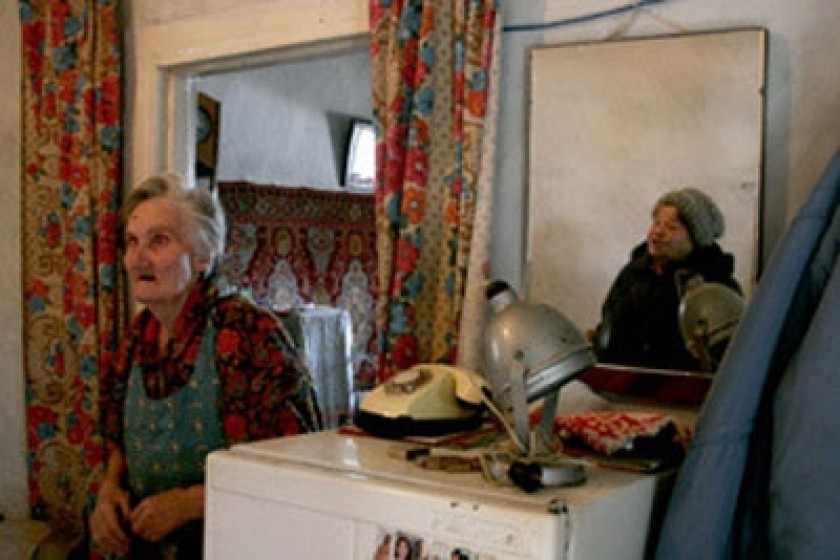
The Jewish Community of Sevan
“I've started taking a new kind of medication.”
“Misha can't walk; his legs hurt.”
This is how an ordinary conversation starts between neighbors Anya Kirilina and Olga Yershova. Or it might begin with a discussion about how their water had been cut yet again and they had been forced to carry it in buckets from other neighbors' apartments.
Anya and Olga are ethnic Russians and members of Sevan's Jewish community. The once flourishing community is now composed of only twelve people, most of them elderly. Anya lives with her husband, community head Mikhail Zharkov, and sister Nadya. Both are ill and bedridden; Anya tends to them alone. Olga lives with her brother Yuri.
Russian Jews settled inArmeniain the 18 th century. The Russian Orthodox Church had for centuries been struggling against heretics who threatened its dominance. This included Russians who practiced Judaism. In the 18 th century, under a decree by Empress Yekaterina II, many “heretics” were exiled to theCaucasus. The Russian Jews living inArmeniawere mainly from the provinces ofTambov, Saratovo and Tul. They settled in thevillageofYelenovka, which gained the status of city in 1953 and was renamed Sevan. Until the beginning of the 20 th century, almost the entire population of Yelenovka was Russian Jews. Jews also lived in Golovino, Semyonovka and Dilijan.
Mikhail Zharkov recalled how large the community was in his youth – 150 families, if not more. The Russian Jews dealt mainly in fishing and farming. Their relationship with Armenians was always been good.
“Armenians have always been empathic towards our traditions – our superiors at work would respect the Sabbath [the Jews view the Sabbath as the seventh day of creation; no work is permitted on this day],” said Mikhail Zharkov.
The Russian Jews would celebrate Jewish holiday throughout the whole community. However, they would sometimes give them different names, for example Purim was called Mordofei, Pesach was called Paska. They even had their own synagogue, although it was shut down during Soviet times and transformed into a shop. The Russian Jews then started gathering in secret at each other's houses, reading the Torah and praying.
They had – and still have to this day – their own cemetery in Yelenovka, where the graves of the earliest Jewish settlers have been preserved. But residents complain that everyone has gone and there is nobody left to care for the cemetery.
Weeds have started growing on the statues and new graves are being dug on top of the old ones.
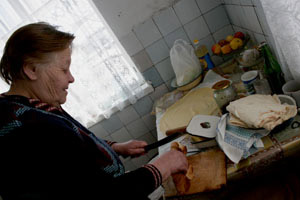 |
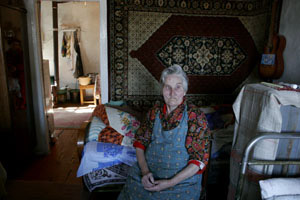 |
“When there is snow in the winter, it's impossible to get there,” said Anya Kirilina, “My grandfather is buried there, but we couldn't visit his grave all winter. We went there later and saw that someone else was digging a grave there. What could I say to them, how could I stop them?”
Olga recalled how once they all used to have Russian stoves in their homes. During Pesach they would all prepare matzoh. On Fridays, they would lead the animals to the barn before sunset, and light the water heaters, bathe and gather to pray.
“We used to have trout here, but they vanished; we had salmon,” recalled Olga, “When we were children, my mother would bake bread in the Russian oven. We would run to the lake and fish for kokhaks , barbecue it on the spot and eat it with bread. Now it's difficult to find salmon. And they're too expensive to buy.”
“We used to live very well during Soviet times; we were rich,” said Mikhail Zharkov, “Fruit was better here than inMoscow. I used to work as a well digger inYerevanand would come to Sevan on weekends. We had a very nice apartment in the city. We sold it, and put the money in the bank – all that money was lost when theSoviet Unioncollapsed.”
Russian schools, where the children of Russian Jews studied, were shut down in independentArmenia, and when socio-economic conditions worsened for everyone, Russian Jews were affected, too. Gradually, the youth started leaving the city – some went abroad to study, some sought jobs in other former Soviet countries.
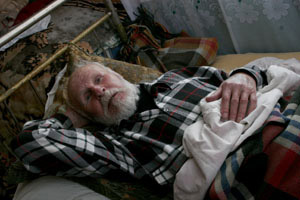 |
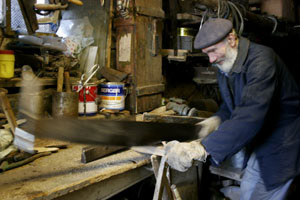 |
Mikhail Zharkov's son and daughter are inMoldova. They can barely support their own families.
“When I retired,” said Mikhail Zharkov, “I supported us by selling smoked fish. I supported us, my children and even help my neighbors. Now I have been unable to work for the past year, because of my illness.”
Mikhail Zharkov's pension is 20,000 drams a month, his wife receives 16,000 drams, and his sister receives even less. This money is spent mainly on medication and food.
Mikhail said that he did not consider himself to be badly off – after all, he was not hungry and naked. Besides that, the Jewish community ofArmeniahelped them with food and by covering some of the utility bills. Otherwise, who could survive on that pension alone?
“Money is nothing,” said Mikhail, “Nothing is worth more than good health. If you're healthy, you will be rich and have everything.”
“We will be having elections soon,” he said, “I have always voted responsibly. But I've been ill for the past year now and don't know how I will go to cast my vote. But what difference does it make to us who wins? A neighbor had come over a few days ago and wanted us to vote for his friend. But I don't even know who the candidates are.”
Olga and Yuri Yershov did not care about the elections either. “What is it to us?” asked Olga, “None of them is going to solve our problems anyway. My son inUkraine, I haven't seen him for sixteen years. They're not giving me an allowance at all, and saying that my son should care for me. My brother doesn't have a family, but they're saying that since we live together, we're a family. He isn't entitled to an allowance either. We get a total pension of 32,000 drams. I have diabetes and high blood pressure and need medicines. We have public utilities we need to pay for. When we were young, our names were on the roll of honor as good workers. Now, who cares about us?”
“The water has been cut – we get water for only one and a half hours a day. So we're forced to bring some in from our neighbors. They gas pipelines have been installed, but we can't get a stove, because we don't have a chimney. We're forced to burn wood. Our house is a few decades old and the floor is rotting. There's a constant draft from all sides. But we have no money to renovate it. When we used to work, we bought this place and built it as best we could. Now we're wearing it down.”
“Alright, that's enough complaining,” said Anya, “It will keep until we die, why do we need a new place?”
“Once, during a Sabbath gathering,” she smiled, “Someone said, ‘How will they bury us when we die? A coffin costs money.' And I replied, ‘All of us have carpets left over from our good days. Let them wrap us up in a carpet each and bury us in the ground. What's the problem?'”
Photos by Nelli Shishmanyan
 Videos
Videos Photos
Photos
Write a comment